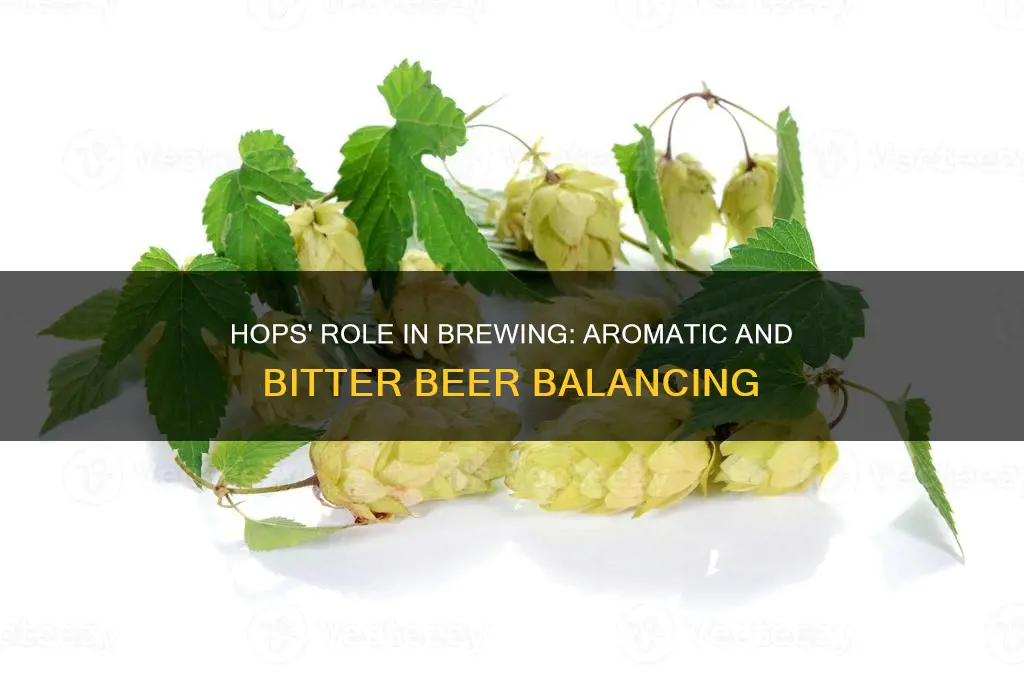
Hops are the flowers of the female hops plant, Humulus lupulus, and are one of the four essential ingredients in beer. They are cone-shaped and green in colour, and contain acids and oils that are responsible for the bitterness, flavour, and stability of the finished beer. They are added to the boil stage of brewing to unleash their alpha acids, which bitter and balance the sweetness of the malt. Hops are also used for their antibacterial properties, as they suppress the growth of undesirable microorganisms, acting as a preservative.
What You'll Learn

Hops add bitterness to beer
Hops are the flowers of the female hops plant, Humulus lupulus. They are one of the essential ingredients in beer, alongside barley, yeast, and water. Hops are associated with bitterness and are added to balance the sweetness of the malt.
Hops contain alpha acids that are released during the boil stage of brewing and contribute to the bitter taste of beer. The degree of bitterness depends on the degree to which alpha acids are isomerized during the boil. The longer the hops are boiled, the more bitter the beer will become. This is because the aromatic oils in the hops, which are responsible for the flavour and aroma, evaporate during a long boiling process.
The hops plant has separate male and female plants, and only the female plants are used for commercial production. The female plants are propagated vegetatively, while the male plants are culled. The cones of the female plants contain tiny yellow pods called lupulin, which contain resin and essential oils that give beer its bitterness, aroma, and flavour.
Brewers can add hops at different stages of the brewing process, depending on the desired result. If a brewer wants to emphasise the bitterness of the hops, they will add them during the kettle boil. If the brewer wants to emphasise the essential oils, they will add the hops during or after fermentation, a technique known as dry hopping.
Different varieties of hops will also contribute different flavours and aromas to the beer. For example, Columbus hops add bitterness, as well as earthy and spicy notes, while Mosaic hops offer notes of berry and stone fruit.
Where to Find Tropical Hop Beer Near You
You may want to see also

Hops add flavour to beer
Hops are most often associated with bitterness, but that isn't the only reason to use them. They also add flavour and aroma to beer. Depending on the style of beer being brewed, and where it's being brewed, the choice and timing of hops will vary. For example, if you're looking for a hoppy beer, you might choose an IPA, which is known for its pronounced bitterness. On the other hand, if you're brewing a darker ale, you might want to emphasise other flavours, like the roasty character of a grain, and use hops in a supporting role.
The flavour and aroma of hops can vary depending on where they are grown and the time of harvest. For example, hops grown in the Pacific Northwest of the United States tend to have milder, more balanced flavours due to the region's milder weather and reliable precipitation. In contrast, hops grown in warmer climates, such as Chico, California, may have more intense, bitter flavours due to the hot summer heat and spotty rain.
Craft brewers are particularly interested in the lupulin inside hop cones, which contains resin and essential oils that contribute bitterness, aroma, and flavour to beer. By adding hops at different stages of the brewing process, brewers can emphasise certain flavours and aromas in their beers. For example, adding hops during the kettle boil can bring out bitterness, while adding hops during or after fermentation can enhance specific flavours or aromas.
The versatility of hops allows craft brewers to experiment with different flavours and create unique beers that highlight the range of possibilities that hops offer.
The Hoppy Truth: Do All Beers Have Hops?
You may want to see also

Hops add stability to beer
Hops are the flowers of the female hops plant, Humulus lupulus, and are one of four essential ingredients in beer. They contain acids and oils that add bitterness, flavour, and stability to the finished beer. Hops are added to the boil stage of brewing to unleash their "alpha" acids, which bitter and balance the sweetness of the malt.
Hops are often associated with bitterness, but they also add stability to beer. The alpha acids in hops are responsible for the bitter taste of beer. During the wort boiling process, the humulones (alpha acids) are thermally isomerized into iso-alpha acids or isohumulones. The degree of bitterness imparted by hops depends on the degree to which alpha acids are isomerized during the boil.
Hops also contain beta acids or lupulones, which contribute desirable aromas to beer. The main components of hops essential oils are terpene hydrocarbons, including myrcene, humulene, and caryophyllene. Myrcene is responsible for the pungent smell of fresh hops, while humulene and its oxidative reaction products may give beer its prominent hop aroma. Together, these three terpene hydrocarbons represent 80 to 90% of the total hops essential oil.
In addition to their bittering and aromatic properties, hops also have antimicrobial effects, helping to ward off spoiling bacteria during fermentation and curb the development of off-flavours. This preservative quality of hops was especially important before refrigeration and modern brewing and storage technologies, as it helped to extend the shelf life of beer.

Hops are used as a preservative in beer
Hops are the flowers, or seed cones, of the hop plant Humulus lupulus. They are added to beer during the boil stage of brewing, as it takes a long time (around an hour) to unleash the "alpha" acids that bitter and balance the sweetness of the malt. The antibacterial properties of hops come from the lupulin within the hop cones, which contains resins and essential oils that contribute to the bitterness, aroma, and flavour of beer.
The use of hops as a preservative in beer is not as essential as it once was, due to modern brewing and storage technologies. However, hops continue to be used for their flavour and bittering properties, which are highly valued in beer, especially in IPAs and craft beers.

Hops are used in the fermentation process
A beer could also be dry-hopped (added during fermentation) or even fresh-hopped (when just-picked hops are brought straight to the brewery). The choice and timing of hops will vary depending on the style of beer being brewed and the desired flavour and aroma.
The hop plant is a vigorous, climbing, herbaceous perennial, usually trained to grow up strings in a field called a hopfield, hop garden, or hop yard when grown commercially. The cones grow high on the bine, and in the past, these cones were picked by hand. Today, harvesting is much more efficient with the use of mechanical hops separators.
Hops contain different oils, such as lupulin, a yellowish, waxy substance that imparts flavour and aroma to beer. Lupulin contains lupulone and humulone, which have antibiotic properties and help to suppress bacterial growth, allowing brewer's yeast to grow.
Brewers may use software tools to control bittering levels in the boil and adjust recipes to account for changes in the hop bill or seasonal variations in the crop. The use of hops in fermentation allows brewers to create a wide range of beer styles, from bitter IPAs to more subtly flavoured ales, showcasing the versatility of this ingredient.
Frequently asked questions
Hops are the cone-shaped flowers of the female hops plant, Humulus lupulus.
Hops add bitterness, flavour, and stability to beer. They also balance the sweetness of the malt.
There are 250 different varieties of hops, but some of the most common types include Columbus, Centennial, Citra, Simcoe, Tettnanger, and Mosaic hops.
Hops are typically added during the boil stage of brewing to extract their bittering qualities. However, they can also be added during or after fermentation to impart specific aromas and flavours.
Hops are one of the essential ingredients in beer, along with barley, yeast, and water. They contribute to the unique flavour and aroma profile of different beer styles.







